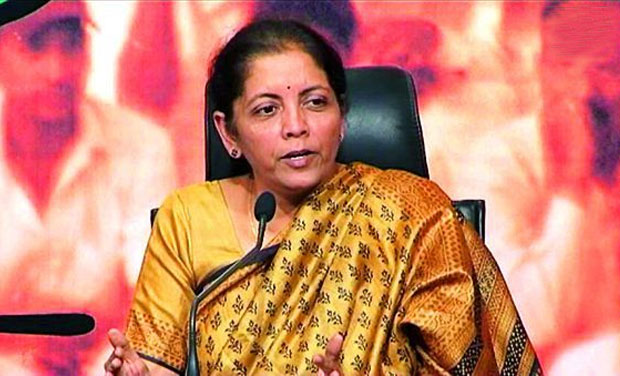
Nirmala Sitharaman joined the BJP in 2008 and has served as a spokesperson for the party. In 2014, she was inducted into Narendra Modi's cabinet as a junior minister and in June 2014, she elected as a Rajya Sabha Member from Andhra Pradesh. In May 2016, she was one of the 12 candidates nominated by the BJP to contest the Rajya Sabha elections due on 11 June 2016. She successfully contested her seat from Karnataka. On 3 September 2017, she was elevated to Defence Minister. After Narendra Modi was re-elected in 2019 she became the first full time woman after Indira Gandhi to hold the Finance Minister post.
Read More
Employees of all public and private sector banks wore black badges to work as a mark of protest to the government's decision.

Illustrating the impact of lower GDP growth, R. Nagraj, professor of economics at Indira Gandhi Institute of Development Research, said that given per capita monthly income of Rs 10,534 in 2018-19, annual GDP growth of 5% means that the per capita income will go up by Rs 526 in FY20.

Objective of the bank mergers is to make them global sized banks, Finance Minister Nirmala Sitharaman said. With these mergers, the number of PSBs will come down to 12 from 27 in 2017.

Finance Minister Nirmala Sitharaman, who had last week announced tax sops and measures for sectors such as auto, announced four new set of mergers -- Punjab National Bank, Oriental Bank of Commerce and United Bank of India will combine to form the nation's second-largest lender; Canara Bank and Syndicate Bank will merge; Union Bank of India will amalgamate with Andhra Bank and Corporation Bank, and Indian Bank will merge with Allahabad Bank.

Finance Minister Nirmala Sitharaman Friday addressed a press conference, wherein she announced some major mergers of the public sector banks. Sitharaman also said loans above Rs 250 crores are being strictly monitored by specialised agencies.

Sitharaman hit out at the Congress for indulging in "huge corruption and scandals" to run the economy and said its tenure saw inflation touching double digits with skyrocketing prices.

This differential regime existed even prior to the 2019 Budget, the Central Board of Direct Taxes (CBDT) said, adding that it was, therefore, not the creation of the Finance (No 2) Act, 2019, or the announcement made by the Finance Ministry last week.

Rahul Gandhi had slammed the Central government Tuesday, over the record cash transfer by the Reserve Bank of India.

Tax experts said that the clarification has watered down the expected benefits of the government announcement and can make return-filing very complicated. One of them said that the structure is very "ridiculously worked out" as it makes things very complex.

In a bid to stabilise the faltering economy, Sitharaman had on Friday announced the removal of surcharge on capital gains on shares for both foreign and domestic investors, provided an upfront Rs 70,000-crore equity infusion into public sector banks to boost lending, and unveiled measures to push automobile sales.

The Finance Minister also announced that violation of corporate social responsibility regulations by corporates will now be taken as a civil offence and not a criminal offence.

The Indian government on Friday announced a raft of measures, including rollback of enhanced super-rich tax on foreign and domestic equity investors, exemption of startups from 'angel tax', a package to address distress in the auto sector and upfront infusion of Rs 70,000 crore to public sector banks, in efforts to boost economic growth from a five-year low.

Finance Minister Nirmala Sitharaman addressed a press conference, where she said the government would withdraw higher taxes on foreign portfolio investors, as announced in the Budget and also withdraw the surcharge on long- and short-term capital gains.

Sitharaman, who also holds the corporate affairs ministry portfolio, flagged the issue of competition sans frontiers and at times, its adverse impact on Indian consumers.

Affordability and availability of retail finance as well as finance for dealers was a major concern for the industry and the announcement today have adequately addressed concerns on both the fronts. The release of Rs 70,000 crore for PSU banks recapitalisation and Rs 20,000 crore for National Housing Bank will give banks and NBFCs enhanced liquidity in the system. Moreover, the linking of repo rate to interest rates charged for vehicle purchase would support lowering of EMIs for auto purchases, thereby boosting demand.

The government has also decided to make necessary changes in PMLA rules and Aadhaar regulations to ease the lending process, Finance Minister Nirmala Sitharaman said.

Sitharaman said that banks will launch repo rate and external benchmark-linked loan products that will lead to reduced easy monthly instalments for housing, vehicle and other retail loans.

The rollback comes after Indian capital markets witnessed massive outflow of foreign funds in the month of July.

Amid reports of a slowdown from various sectors, Finance Minister Nirmala Sitharam has said that India's economy is not in a recession.

Addressing a press conference at the party headquarters, former Union Minister and senior Congress leader Manish Tewari said, "The silence of the Prime Minister and the Finance Minister is deafening." He said the country is witnessing the politics of vendetta and an unprecedented and undeclared emergency-like situation. Slamming the government, Tewari said, "The government does not have a clue about how to handle this economic crisis, which is intensifying every day in the country."
Top News
Trending News
Latest News